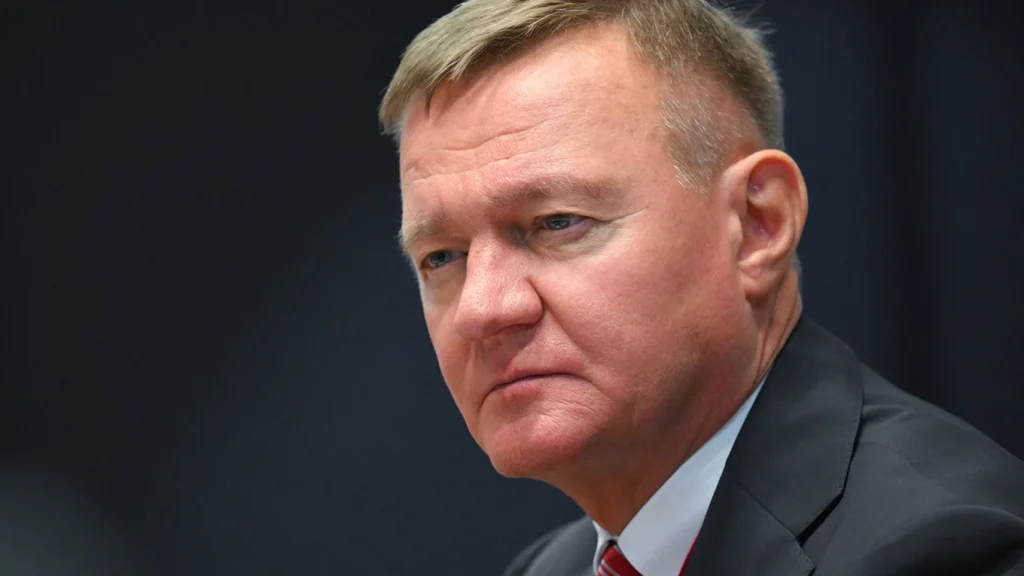Russia’s former Transport Minister Roman Starovoit, 53, was found dead with a gunshot wound in his car in Odintsovo, a Moscow suburb, on July 7, 2025.
This comes hours after President Vladimir Putin dismissed him, according to Russia’s Investigative Committee.
The agency, led by spokesperson Svetlana Petrenko, considers suicide the primary hypothesis, noting a Makarov pistol—awarded to Starovoit in 2003 for public safety service—found beside him.
The timing and circumstances of his death, coupled with his sudden dismissal, have fueled speculation about ties to a corruption probe linked to his tenure as Kursk region governor.
Circumstances of Death and Dismissal
Starovoit’s body was discovered in his vehicle in an elite Odintsovo neighborhood, with law enforcement seen removing it Monday evening.
The Kremlin’s decree, published at 9:15 a.m. on July 7, relieved Starovoit of his duties without explanation, appointing deputy Andrei Nikitin as acting minister.
While the Investigative Committee has not confirmed the exact time of death, State Duma member Andrei Kartapolov claimed Starovoit died “quite a while ago,” with some Russian media suggesting his death may have preceded the decree, possibly occurring as early as Friday.
Starovoit was last seen publicly on Sunday, receiving reports in the ministry’s situation room.
Speculation on Corruption and Kursk Connection
Russian media, including Kommersant, report that Starovoit’s dismissal may be linked to an embezzlement investigation involving 19.4 billion rubles ($246 million) allocated for Kursk region border fortifications during his governorship (2018–2024).
The probe, which led to the April 2025 arrest of his successor, Alexei Smirnov, and deputy Alexei Dedov, alleges funds were misappropriated, weakening defenses against a Ukrainian incursion in August 2024—the first foreign occupation of Russian soil since World War II.
Smirnov’s testimony reportedly implicated Starovoit, raising the possibility of impending charges.
Political analyst Yevgeny Minchenko called the dismissal “predictable,” citing Kursk’s failures.
Transport Sector Challenges
Starovoit’s tenure as transport minister, beginning in May 2024, coincided with severe disruptions, including 485 flight cancellations and 1,900 delays over July 5–6 due to Ukrainian drone attacks.
An ammonia leak from an explosion at Ust-Luga port further strained the sector, already hampered by Western sanctions limiting spare parts and high interest rates impacting Russian Railways.
While some speculated these failures contributed to his dismissal, most analysts argue the Kursk corruption probe was the primary factor, as drone-related disruptions are routine.
Kremlin’s Response and Broader Context
Kremlin spokesperson Dmitry Peskov denied Starovoit’s dismissal stemmed from a “loss of trust,” emphasizing Nikitin’s qualifications.
However, the lack of clarity fueled speculation, with posts on X, including from @RT_com, noting Starovoit faced potential questioning over embezzlement on the day of his death.
Russia’s pattern of targeting dismissed officials with corruption charges, as seen with former Defense Minister Sergei Shoigu, suggests political scapegoating amid military setbacks.
The Kursk incursion, a major embarrassment for Putin, has driven a broader crackdown on officials linked to border failures.
Looking Ahead
The ongoing investigation into Starovoit’s death, coupled with the Kursk embezzlement probe, underscores Russia’s internal pressures as the Ukraine war continues.
While suicide remains the leading theory, unconfirmed reports of an earlier death raise questions about the official narrative.
As Putin consolidates power, the transport sector’s challenges and corruption allegations will likely keep the Kremlin under scrutiny, with Nikitin tasked to stabilize a critical industry.




















